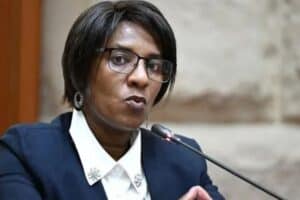While the president expressed his mock shock, it was, in fact, the assembled journalists who should have been surprised.

“I am shocked!” President Cyril Ramaphosa said in mock surprise as he entered a room filled with some of his staunchest critics – journalists – on Tuesday.
The journalists laughed as he used the oft-derided phrase of his.
The journalists had been waiting on the president for a few minutes in a briefing room in Tuynhuys – the grand old Cape Dutch manor next to parliament which serves as the president’s Cape Town office – for an engagement organised by the presidency and the South African National Editors’ Forum (Sanef), to which members of the Parliamentary Press Gallery were also invited.
While the president expressed his mock shock, it was, in fact, the assembled journalists who should have been surprised because an on-the-record engagement with Ramaphosa is a very rare occurrence.
As is the practice when journalists are invited to Tuynhuys, they had to be there an hour before the scheduled start, on Tuesday this meant at 1pm. After hanging about in a waiting room close to the entrance – not the fancy entrance behind the gates – the journalists were ushered to a boardroom.
After sitting there for a few minutes, they were welcomed by presidential spokesperson Khusela Diko, and then shown to another room, where a lunch was served.
From there, it was on to the briefing room. Usually, the room would have rows of chairs, but on this occasion, the chairs were behind round tables, with two chairs and a podium on the low stage.
Ramaphosa took his seat on one of the chairs, smiling. Dressed in his usual garb of a suit, dress shirt and tie, he appeared relaxed.
“I am shocked!” he joked again, when acting Sanef chairperson Katy Katopodis said that Diko contacted Sanef about the engagement days after the media organisation resolved to request such a meeting.
Ramaphosa started off by saying that journalists played a “significant role in exposing state capture and corruption” and said the media had an important role to play as a “bulwark against abuses of power”.
He said the media had also been affected by the weak economy.
As he spoke about the economy with a serious expression, he said the fact that South Africa was in a technical recession didn’t come as a “shock or surprise”, because the signs were there.
He spoke about the coronavirus, rebuilding public institutions, corruption and Eskom. While the information was the technocratic stuff of parliamentary speeches, his delivery was more conversational.
Towards the end of his prepared speech, a smiling Ramaphosa said he would conclude with some time to ask the journalists some questions, to some nervous laughs from his audience.
After the president’s speech, Diko invited journalists to engage and comment, but, naturally, a string of questions followed.
Ramaphosa appeared amused when he was asked to rate his own performance and emphasised that he was a hard worker.
“Some of the things I’ve had to do may have shocked you, but the one thing that I have sought to do is to continue my hard work rate – I am not lazy,” he said.
He also described his leadership style as that of a consensus builder.
“Some people would like me to be a dictator, but it is not in my makeup to be a dictator. I have never been. I’ve built and led a number of organisations without being a dictator, working very well with people and making them feel worthwhile and worthy to work in an organisation and respecting the capability of people – not give in to shouting and screaming at people and so on. That is my style,” he said.
After the event, the journalists were ushered to the steps at the fancy entrance on the Company Gardens side of the building for a photo.
Only after the journalists were lined up on the steps was Ramaphosa called to join, standing in the centre of the front row.
Afterwards, a man who was part of the delegation took a selfie with Ramaphosa.
For more news your way, download The Citizen’s app for iOS and Android.






